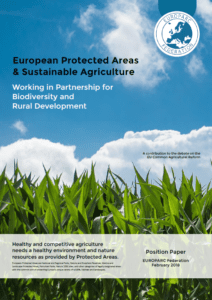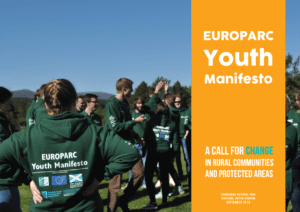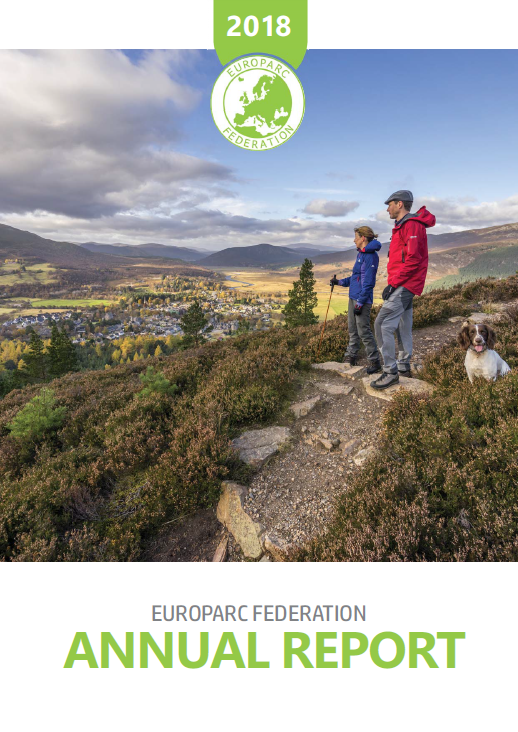Lessons from Greece: Protected Areas are key to local economic development
Sokratis Famellos, Alternate Minister for Environment and Energy of Greece at the XI Charter Network Meeting in Greece, April 2019
The Management Bodies of Protected Areas should contribute to local economic development
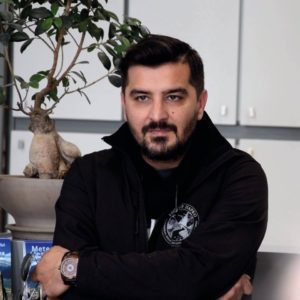
Serafeim Felekis
Article by Serafeim Felekis, President of Tzoumerka, Valley of Acheloos River, Agrafa and Meteora National Park
The Alternate Minister for Environment and Energy of Greece, Sokratis Famellos, was one of the special guests we welcomed at the 11th Charter Network Meeting. During his speech, Mr Famellos focused on the development perspective of the environment, specifically stating that
environment is life and economy.
He further highlighted the controversy between European policies that were imposed on Greece during the economic crisis: not only were these policies in full contradiction with the UN Sustainable Development Goals, creating more poverty, unemployment and limiting access to basic goods and services, but they were also opposed to environmental protection.
Past decisions
The Alternate Minister noted the former decision to close down Management Bodies responsible for the protection and management of Protected Areas in Greece, in an effort to cut down government spending. This decision was taken at the same time when the European Commission was imposing penalties to Greece because of gaps in the implementation of the European legislation for the management of Protected Areas.
‘This was the situation back in 2015’, said the Alternate Minister. ‘Now, we need to be aware that the forthcoming European elections are critical, because their result will also determine the future of the European Environmental agenda: whether progressive policies will be developed and implemented also for the environment and towards the UN Sustainable Development Goals.’
He further explained that Greece is a very rich country in terms of biodiversity, hosting many species that are unique across Europe. With Southern Europe being a biodiversity hotspot for the European Union, the European Union should, in turn, apply coherent policies that protect and conserve this unique natural capital.
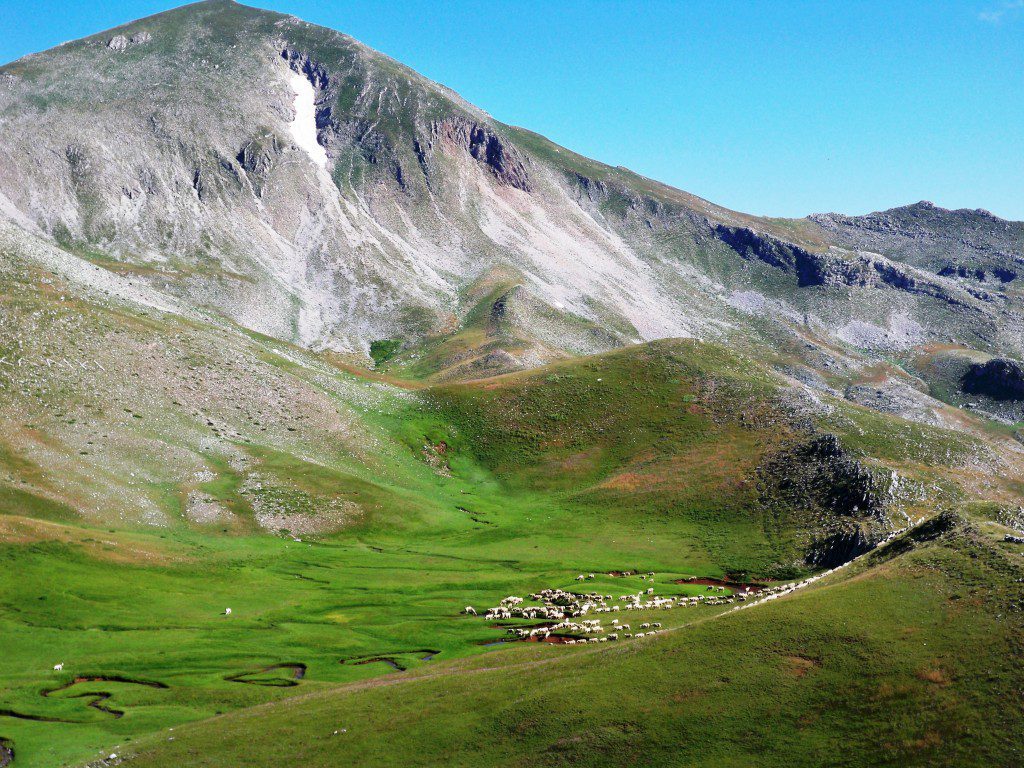
The Tzoumerka, Valley of Acheloos River, Agrafa and Meteora National Park is one of the largest Parks in Greece, providing social and economic benefits to the local communities.
The urge for action
From 2015 and onwards, Greece decided that there was no more time to lose in any environmental policy field. Major steps included:
- The implementation of integrated waste management throughout the country, enabling and motivating local authorities towards recycling and investing in modern waste management infrastructure;
- The issue of the updated and enhanced catalogue of Natura 2000 areas in December 2017;
- The institutionalization, by law, of Management Bodies for all Protected Areas across Greece, also foreseeing for the first time that these will be funded by the central government budget. As direct consequence, all employees working in Management Bodies have the opportunity, to obtain, through a transparent process managed by the Supreme Council for Civil Personnel Selection (in Greek: ASEP), a permanent employment status, in the area where they have been working all these years.
- The launch of two very important projects, for all Protected Areas:
- Specific environmental studies that map and assess the impacts of land uses and economic activities in all Natura 2000 areas, so as to develop the relevant Presidential Decrees regulating such uses/activities and the Action Plans for protected species (total budget of 17.5 MEuro)
- The 8-year LIFE Integrated Project LIFE-IP 4NATURA, which also develops specific tools for biodiversity conservation in Protected Areas (budget 17 MEuro).
The Commitment
The Alternate Minister also noted that together with biodiversity protection and implementation of the relevant International Conventions and legislation,
Management Bodies now also have to contribute to the local economy and catalyse local production growth.
‘We need local output and activities that are competitive and extrovert, bearing the designation of the areas that produce them. The evaluation of the operation of all Management Bodies will also assess their contribution to the development of the primary and secondary sectors, and also of eco-tourism and agro-tourism activities.
They will also be evaluated in terms of developing opportunities for local employment, not only for the employees of the Management Bodies themselves but also for all of the rural population in the corresponding areas.
Planning is over, now is the time to act and implement. I am thus asking everyone to contribute to the much-needed change of our paradigm for economic development, creating new development and new economic output’, committed the Alternate Minister.
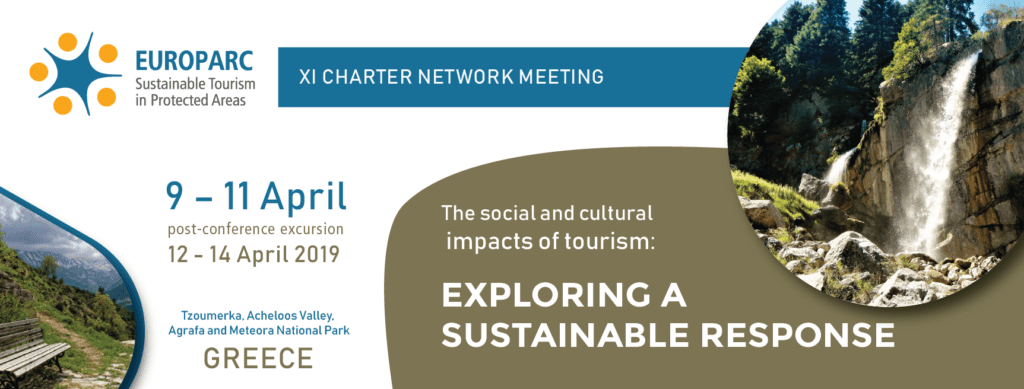
Read the outcomes of the XI Charter Network Meeting that was host by Tzoumerka National Park
A look into 2018: EUROPARC Annual Report 2018
Cairngorms National Park
EUROPARC Annual Report 2018
By Ignace Schops, EUROPARC President
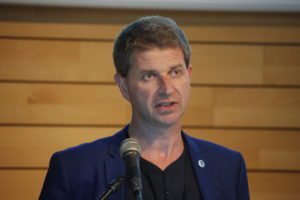
Ignace Schops
Today, across Europe, Protected Areas face challenges and pressures unforeseen by our enlightened predecessors. In response, parks of today and tomorrow must see nature, people, culture and community as part of the assets of the area.
We have continued in 2018, as the representative body of Europe’s Protected Areas, to be the collective voice for all nature and landscape areas and we have continued to build a stronger, unifying, European network organisation that is better placed to support our members and to respond to these current and future challenges Europe’s nature is facing.
In particular, we have continued to engage with the European Commission, providing a valuable platform to share directly member’s management experiences, discuss policy developments whilst gaining the perspective of the Commission on the subjects relevant for Protected Areas and Natura 2000 sites. The work of regional parks and particularly of periurban Protected Areas, has been central in these discussions.
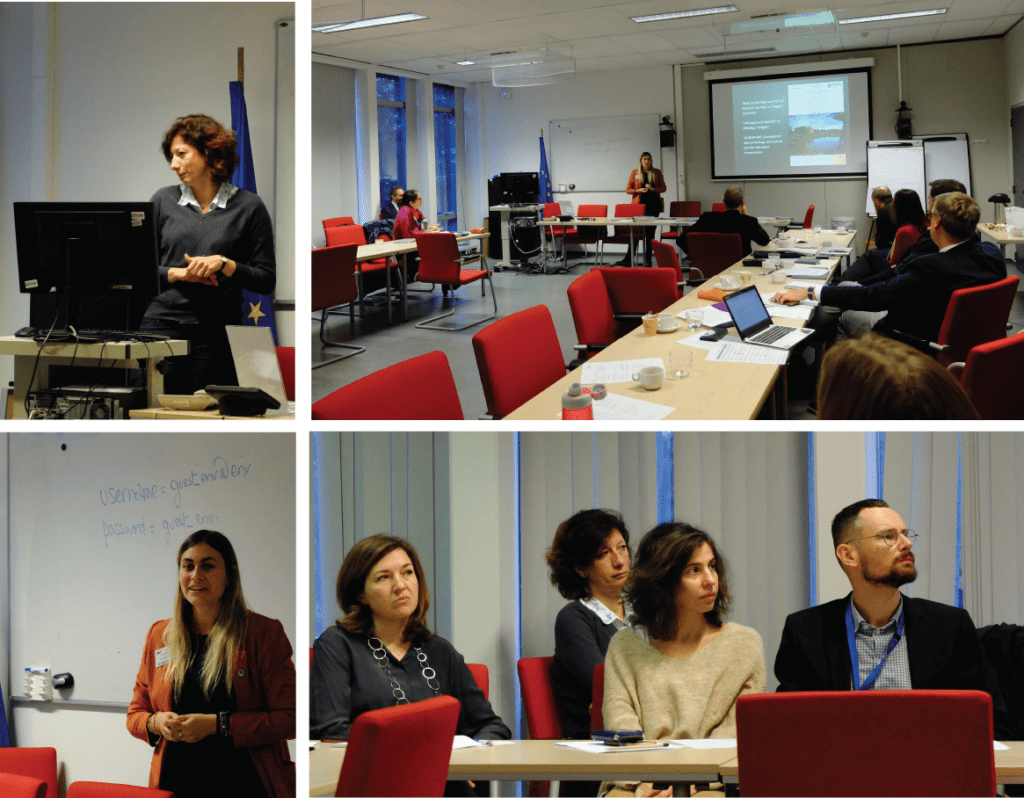
The Seminar- Dialogue on European policies, co-organised annually with the DG ENV, is an opportunity to bridge the policy and legislative work in Brussels with experience in the field from EUROPARC members. Read more about it here.
EUROPARC too, made a big investment over the year to contribute to the Agriculture Policy development, which would inevitably have a relevant impact for biodiversity in the coming years. The debate over the sustainability of agriculture has also been growing within the Protected Areas network over recent years.
A EUROPARC policy position on agriculture has been developed and published and we continue to develop a European tool for Protected Areas to support them in building partnerships with the farming sector and to promote good practices for a more sustainable agriculture in natural areas.
Finally, a real highlight of the year was the launch of the EUROPARC Youth Manifesto at our conference in Cairngorms National Park, Scotland. The conference itself was peppered with the passion and enthusiasm of our youth calling for Protected Areas to take action in order to ensure young people can live and work in our rural areas, ensuring we retain the living working landscapes that is our European heritage.
The Youth Manifesto was an excellent collaboration with youth representative from across Europe. Authenticity of the Manifesto comes from expression of need, issues and solutions being identified by youth. But credibility must come from EUROPARC members developing project plans and implementing actions through adopting solutions from the Youth Manifesto.
Let us rise to the challenge to ensure a future for our youth and for Protected Areas.
and visit this page to download EUROPARC previous Annual Reports!
Life on the edge: Greening the city boundary – an interactive webinar!
Life on the Edge: Greening the city boundary.
Periurban parks contributing to Environmental, Climate Change, Urban, Health and other EU policies
- 10th May 2019
- 11:00 CEST
- Register here
While living in a city has many advantages, it can be harsh sometimes with problems of pollution, climate change, biodiversity loss, or other environmental issues which affect health and overall well-being. Located in the outskirts of cities, Periurban Parks are multi-functional spaces that provide natural solutions to tackle all these issues. In this interactive webinar, you will hear about the important role Periurban Parks already play in some EU environmental policies and their place in many others.
This webinar is a taster of the EU Green Week 2019, this year with the theme “TAKE THE INITIATIVE! Applying environmental legislation“. Our special guests will share how policy is being implemented – and their main challenges and conquers – from 2 very different periurban parks.
In this interactive webinar, participants will be able to join in with their own video camera, share examples from their parks and direct their questions to the invited guests.
Teresa Pastor, EUROPARC expert in the periurban agenda, will introduce the webinar and shed light on the “Periurban Natural & Rural Parks: Their place in the EU Policies”, a Position Paper EUROPARC is about to release.
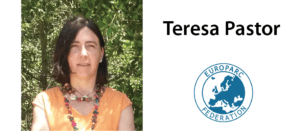
From an industrial Park…to a social project: the Nord Milano Park
The Parco Nord Milano (North Milan Park) was established in 1975, covering 780 hectares of an area that has been the center of Milan’s industrial district and its heavy steel industry. The park was founded to convert and re-qualify those areas, over a period of gradual deindustrialization and outsourcing of manufacturing processes. The park combines woodlands and agricultural areas.
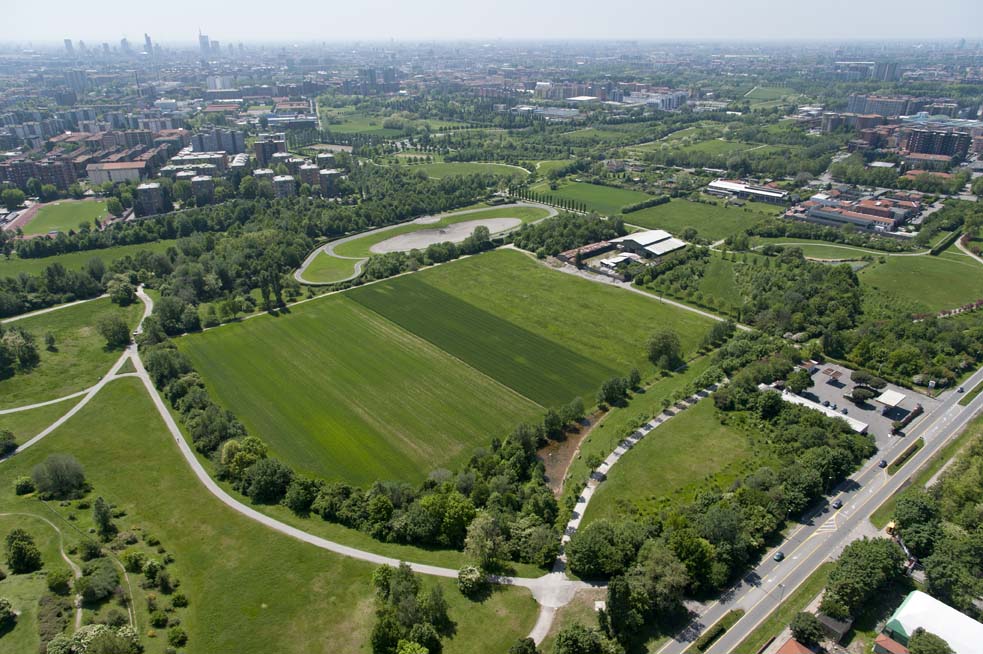
Parco Nord Milano
From an industrial camp to a social project, the park is an active promoter of social integration, developing many projects with minorities and refugees from the region. To promote healthier food habits and aiming to increase awareness and boost engagement, the park created “community vegetable gardens” and work frequently with schools and families. They are also actively working with local partners to develop health activities in the park and promote recreational sport.
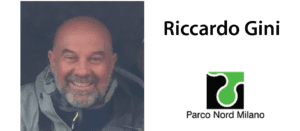 Riccardo Gini is the Director of Parco Nord Milano, in charge of a PA of 40 employees and as many collaborators. Within its functions, he has always dealt with the planning and coordination of the Parco Nord construction operations. Riccardo is an agronomist and apart from agricultural projects, he has worked in the redevelopment of natural spaces and the Urban Rehabilitation Programs.
Riccardo Gini is the Director of Parco Nord Milano, in charge of a PA of 40 employees and as many collaborators. Within its functions, he has always dealt with the planning and coordination of the Parco Nord construction operations. Riccardo is an agronomist and apart from agricultural projects, he has worked in the redevelopment of natural spaces and the Urban Rehabilitation Programs.
Monsanto, a Forest Park inside the European Green Capital 2020
Monsanto Forest Park is a Forest installed in Lisbon’s Council in 1934, with ca 1000 ha and covered with a very diverse flora. Despite being a Periurban Park was already considered by many as an Urban park. Not as a result of any change in its concept, simply because it was swallowed by the city expansion and its satellites. Surrounded by a growing population, the park is challenged to find creative solutions with trail systems and infrastructure, to minimise impacts on biodiversity, and maneuver visitor flows.
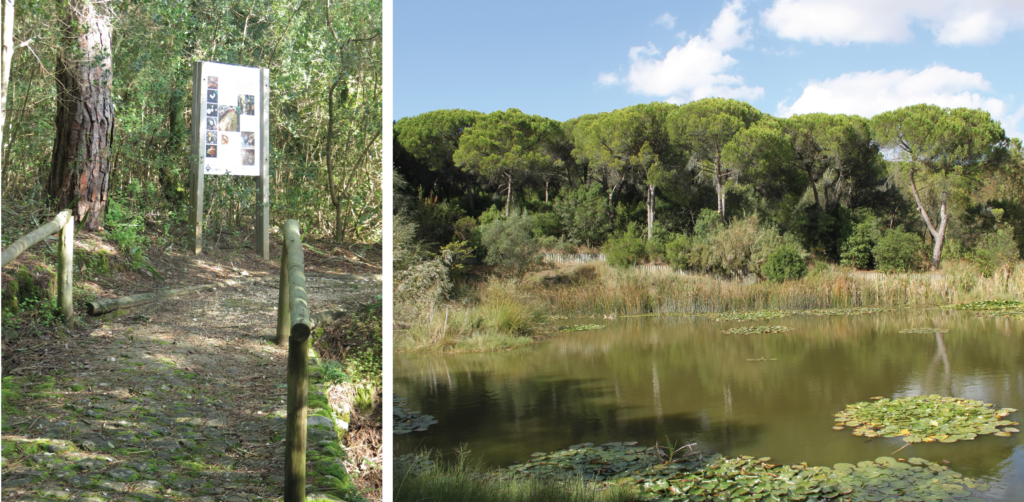
Monsanto Forest Park, Lisbon, Portugal
Fernando will tell us about their biodiversity strategy and green infrastructure, but will also show us what it means, for the only forest park in Lisbon, to be inside “The European Green Capital for 2020”. What measures are changing? What is the role of the park within the city green strategy?
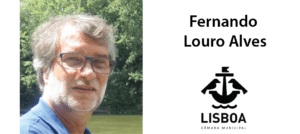
Fernando Louro Alves is Forester Engineer Senior Advisor in the Lisbon City Council, serving in the Management Division of the Monsanto Forest Park, from the Department of Green Spaces. Apart from his degree in Forest Engineering specialized in management of natural resources, Fernando has training in Landscape Architecture and holds a Masters in regional and urban planning.
How to join?
Webinars are open not only to EUROPARC members – but to everyone with an interest in Protected Areas. Participation is free but registration is necessary. Register here.

To learn more about the EU Green Week 2019, running between the 13th – 17th May, please visit: https://www.eugreenweek.eu/
Leonardo, the (young) voice of Prealpi Giulie – EU Youth Week 2019
Leonardo Cerno, Prealpi Giulie Nature Park, Italy © Luca Deganutti
Between the 29th April to 5th May, hundreds of young Europeans are gathered in Brussels, enjoying the European Youth Week. Every two years, the European Commission (DG EAC with the cooperation of other DGs), organises a week full of conferences, workshops, and networking activities specially dedicated to youth. This year, with the theme “Democracy and me”, participants will be challenged to think and commit to new ways to influence decisions and be active in society.
What nature does for you – What you can do for nature
Nature and biodiversity were among the main topics discussed by the young participants over the past days. To spark engagement for nature among participants, DG Environment organised a participatory workshop, on the 30th April. The almost 50 participants were challenged to consider “What nature does for you” and commit on their own future actions for nature. To inspire them, young volunteers with experiences in nature conservation projects were invited to share their experience – and Leonardo Cerno was one of the guests. This is his story.
Leonardo, the (young) voice of the Prealpi Giulie Nature Park
Leonardo has witnessed almost twenty-five springs in the Julian Alps. Since his childhood, he was only to be found outdoors… a tendency that obviously grew after he joined the Junior Ranger programme in his park. The Prealpi Giulie mountains seeded him a wish to work for nature and to have a positive impact in the development of his region, of is so-called home.
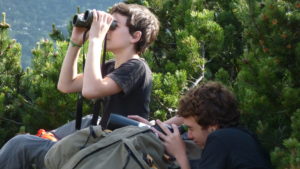
Junior Rangers in the Prealpi Giulie Nature Park © Leonardo Cerno
The last years of Leonardo´s life were shared between classrooms, exams (he is studying natural sciences), and projects in the Park. After he reached the 18-year limit of the Junior Ranger programme, he kept engaged with the Park´s activities and, together with other colleagues from across Europe, formed the first generation of the Youth+ programme.
Currently, Leonardo organises workcamps and several activities for schools and volunteers in the Park, and is also a member of the local civil protection. Not to mention Leonardo is also an excellent guide… those that know the mountains by heart.
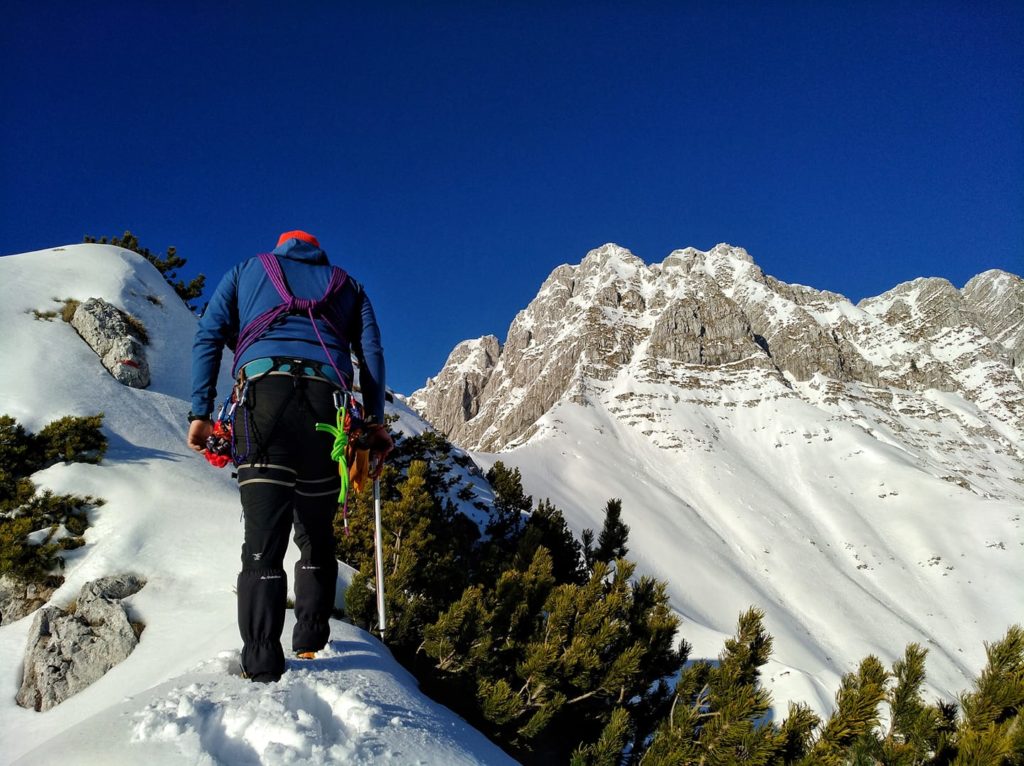
Leonardo Cerno, Prealpi Giulie Nature Park, Italy © Luca Deganutti
Youth, committed for the Future
Meanwhile, Leonardo and some of his young mates who shared the same passion for the mountains established the first Youth Advisory Board in the region. Young people the local municipalities are now connected and organised to start playing a proactive role in the regional activities, local governance structures, and in the work of the Park.
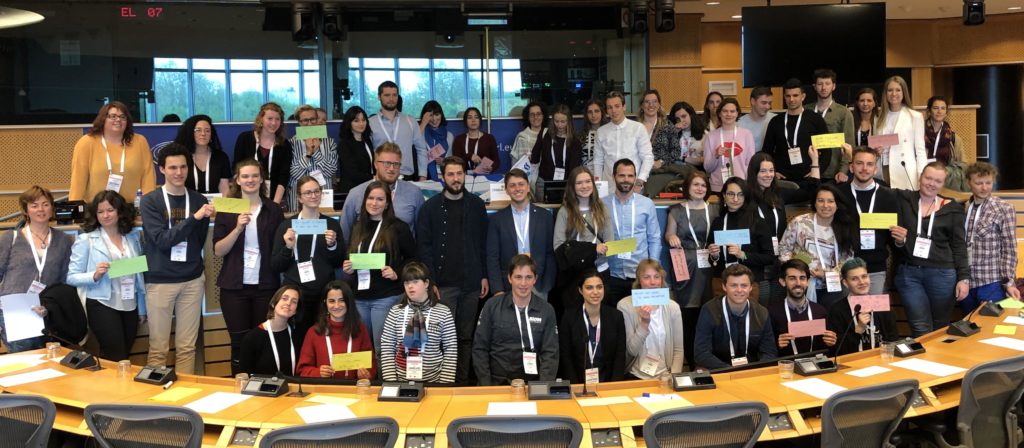
Participants of the Workshop “What nature does for you – What you can do for nature”, at EU Youth Week 2019, European Parliament, Brussels
Well, but let´s go back to Brussels, during the workshop Leonardo shared his experienced and introduced the EUROPARC Youth Manifesto project, – which has precipitated a series of interesting questions in the ongoing activities, told us Leo:
It was a great experience and I had a lot of questions from participatins about the Junior Ranger and Youth projects, but many more about the Youth Manifesto! So I am convinced the interest is raising, and we should continue our work!
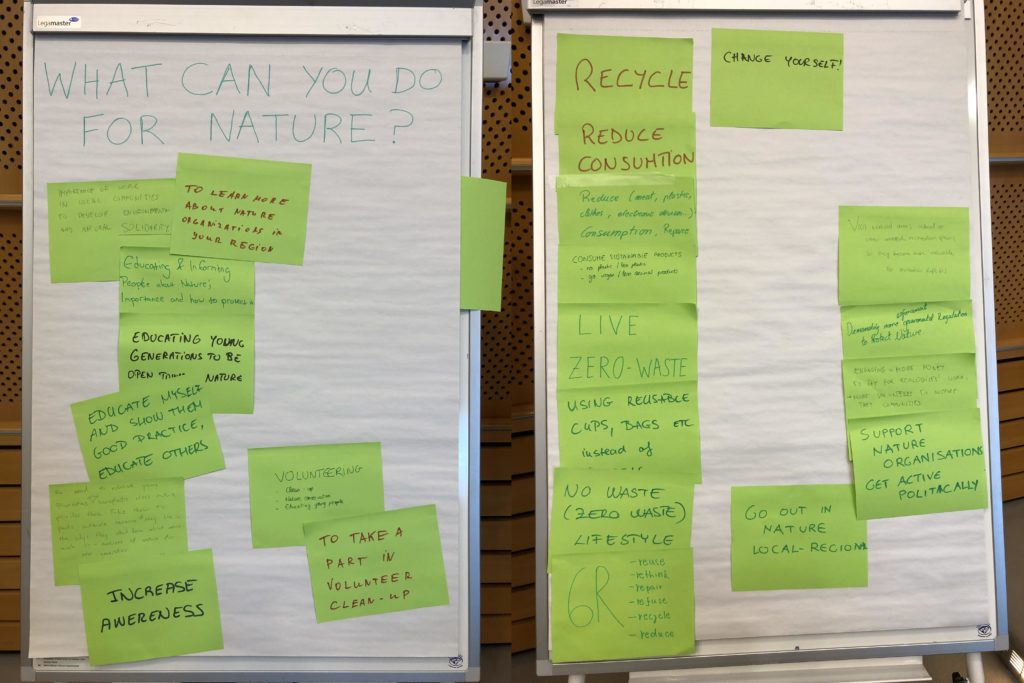
What needs to be done to address the biodiversity crisis to save the planet?
In the afternoon, a second session organised by DG Environment took place. This time the focus was on understanding what is being done – and what needs to be done – to halt biodiversity loss.
Leonardo joined this session too, this time to share the Nat2Care Project, an INTERREG project between Italy and Slovenia with the aim to improve the conservation status of 3 protected areas across borders. Interesting is the focus given to citizen engagement initiatives envisaged in the project to promote awareness raising and personal involvement.
Micheal O’Briain, Deputy Head of Unit, Nature Protection Unit in DG Environment, and moderator of this session, closed with an important remark to the European Union, and the importance of networking and cooperating – as problems are similar all across Europe, we need to connect and share our experiences.
We want to hear from you too. Tell us how you are engaged in the activities of your Park, how your park is giving opportunities to young people. Share them with #EUROPARCyouthmanifesto or send them to youth @ europarc.org.
 The EU Youth Week is still running! You can follow live some of the events and check the full programme here.
The EU Youth Week is still running! You can follow live some of the events and check the full programme here.
